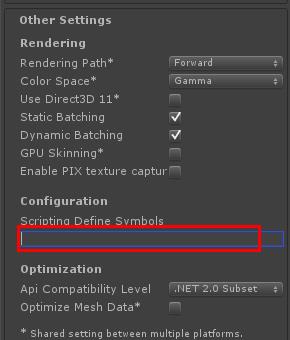在开发中,特别是unity的跨平台中,我们常常会在各个平台游走,如安卓版,苹果版,PC版......。在此不同的平台上,有可能我们须要做不同的操作。然而我们就能够用unity的自带的平台宏定义方式来做平台的推断。Unity帮我们定义了例如以下平台预处理:
| 名称 |
描写叙述 |
| UNITY_EDITOR |
Define for calling Unity Editor scripts from your game code. |
| UNITY_STANDALONE_OSX |
Platform define for compiling/executing code specifically for Mac OS (This includes Universal, PPC and Intel architectures). |
| UNITY_DASHBOARD_WIDGET |
Platform define when creating code for Mac OS dashboard widgets. |
| UNITY_STANDALONE_WIN |
Use this when you want to compile/execute code for Windows stand alone applications. |
| UNITY_STANDALONE_LINUX |
Use this when you want to compile/execute code for Linux stand alone applications. |
| UNITY_STANDALONE |
Use this to compile/execute code for any standalone platform (Mac, Windows or Linux). |
| UNITY_WEBPLAYER |
Platform define for web player content (this includes Windows and Mac Web player executables). |
| UNITY_WII |
Platform define for compiling/executing code for the Wii console. |
| UNITY_IPHONE |
Platform define for compiling/executing code for the iPhone platform. |
| UNITY_android |
Platform define for the Android platform. |
| UNITY_PS3 |
Platform define for running PlayStation 3 code. |
| UNITY_XBOX360 |
Platform define for executing Xbox 360 code. |
| UNITY_NACL |
Platform define when compiling code for Google native client (this will be set additionally to UNITY_WEBPLAYER). |
| UNITY_FLASH |
Platform define when compiling code for Adobe Flash. |
|
|
以后我们能够依据如上宏定义就能够去轻而易举的非常easy去在我们代码中增加推断了。我举个简单样例,例如以下:
- using UnityEngine;
- using System.Collections;
-
- public class Recompile : MonoBehaviour
- {
-
- private string platform = string.Empty;
-
- void Start()
- {
- DebugPlatformMesaage();
- }
-
- void DebugPlatformMesaage()
- {
-
- #if UNITY_EDITOR
- platform = "hi,大家好,我是在unity编辑模式下";
- #elif UNITY_XBOX360
- platform="hi,大家好,我在XBOX360平台";
- #elif UNITY_IPHONE
- platform="hi,大家好,我是IPHONE平台";
- #elif UNITY_ANDROID
- platform="hi,大家好,我是ANDROID平台";
- #elif UNITY_STANDALONE_OSX
- platform="hi,大家好,我是OSX平台";
- #elif UNITY_STANDALONE_WIN
- platform="hi,大家好,我是Windows平台";
- #endif
- Debug.Log("Current Platform:" + platform);
- }
- }
上面假设我是在Editor状态下的话,就能看见打印出: 
我们也能够自定义宏定义,在PlayerSetting中定义:

比如我在上面圈起来的地方填写一个CUSTOM_ITF这个预编译指令。然后在DebugPlatformMesaage函数尾部增加这句话
- #if CUSTOM_ITF
- customMsg = "我自己定义了预编译";
- #endif
- Debug.Log(customMsg);
然后我们执行看下,你就能在控制台看见我们输出的信息了:

当我们把我们自己定义的宏定义给去掉的时候,我们打印的信息就不会出来。
除了这些,unity中还有各个版本号的宏定义,一般开发插件的大牛都会用到。
| UNITY_2_6 |
Platform define for the major version of Unity 2.6. |
| UNITY_2_6_1 |
Platform define for specific version 1 from the major release 2.6. |
| UNITY_3_0 |
Platform define for the major version of Unity 3.0. |
| UNITY_3_0_0 |
Platform define for the specific version 0 of Unity 3.0. |
| UNITY_3_1 |
Platform define for major version of Unity 3.1. |
| UNITY_3_2 |
Platform define for major version of Unity 3.2. |
| UNITY_3_3 |
Platform define for major version of Unity 3.3. |
| UNITY_3_4 |
Platform define for major version of Unity 3.4. |
| UNITY_3_5 |
Platform define for major version of Unity 3.5. |
| UNITY_4_0 |
Platform define for major version of Unity 4.0. |
| UNITY_4_0_1 |
Platform define for major version of Unity 4.0.1. |
| UNITY_4_1 |
Platform define for major version of Unity 4.1. |
| UNITY_4_2 |
Platform define for major version of Unity 4.2. |
|


